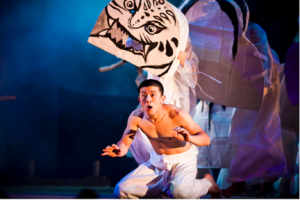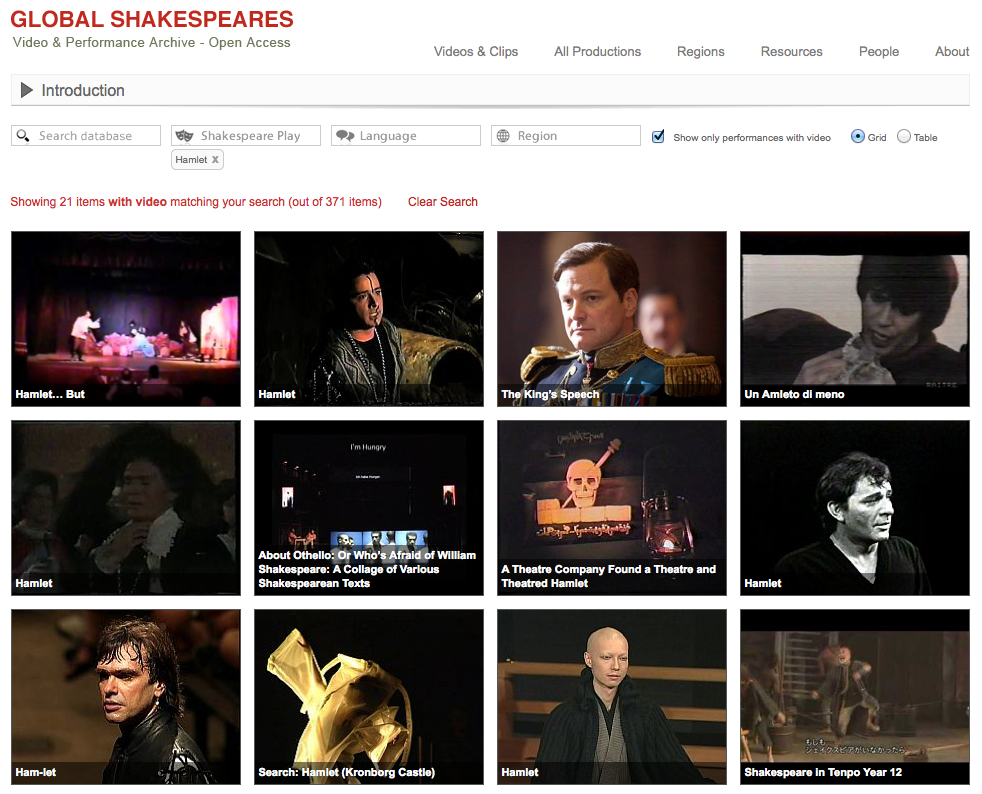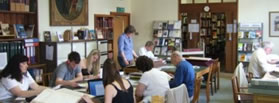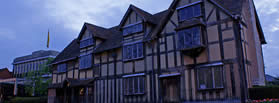This post is part of Year of Shakespeare, a project documenting the World Shakespeare Festival, the greatest celebration of Shakespeare the world has ever seen.
By Alexander Huang, George Washington University
Can Shakespeare’s plays give a “local habitation” to the “airy nothing” of globalization? Shakespeare is proclaimed, once again, the bearer of universal currency and Britain’s national poet as the London Olympics draw nearer. Much more ambitious than the Royal Shakespeare Company’s 2006 “Complete Works” Festival, the World Shakespeare Festival in summer 2012 will bring theatre companies from different parts of the world to perform Shakespeare in their own languages. Shakespeare has been transformed from Britain’s export to import industry, but the meaning of this “return” is ambiguous.
 But
a story of cultural globalization already unfolded last year at the
2011 Edinburgh International Festival which featured Asian performing
arts ranging from theatre to ballet. The renowned South Korean stage
director and playwright Oh Tae-suk mounted his version of The Tempest
to critical acclaim in Edinburgh. Master Oh’s adaptation brought the
play born at the “dawning moment of British colonialism” and inspired by
“the wreck of a ship bound for Virginia” to the shore of traditional
Korea, and back to the U.K. (Michael Dobson, “Shakespeare and Korea,”
play bill of the Mokwha Repertory Company’s The Tempest,
Edinburgh, August 13-16, 2011, n.p.). A work that has routinely been
politicized by artists in nations that were formerly colonized, The Tempest
was transformed by Oh into a play infused with a sense of lightness and
Oh’s wit. Like Prospero, the Daoist magician King Zilzi rules the
island and orchestrates the shipwreck out of revenge. But he brings the
men to his island partly because it is high time his fifteen-year-old
daughter “met somebody.” The Korean Miranda later reminds her suitor
that the question about her purity is ridiculous, after all she has
grown up on “a desert island.” The European premiere of Oh’s Tempest
demonstrates that while works that criticize global inequalities
receive more attention from Western critics, the genre of productions
critical of resource inequities or the geo-political status quo,
represent but one perspective. Oh’s version is not exactly a rollicking
comedy, but extrapolates something extraordinary from both the
Elizabethan genre of romance and the Korean tradition of hybrid
theatrical genres.
But
a story of cultural globalization already unfolded last year at the
2011 Edinburgh International Festival which featured Asian performing
arts ranging from theatre to ballet. The renowned South Korean stage
director and playwright Oh Tae-suk mounted his version of The Tempest
to critical acclaim in Edinburgh. Master Oh’s adaptation brought the
play born at the “dawning moment of British colonialism” and inspired by
“the wreck of a ship bound for Virginia” to the shore of traditional
Korea, and back to the U.K. (Michael Dobson, “Shakespeare and Korea,”
play bill of the Mokwha Repertory Company’s The Tempest,
Edinburgh, August 13-16, 2011, n.p.). A work that has routinely been
politicized by artists in nations that were formerly colonized, The Tempest
was transformed by Oh into a play infused with a sense of lightness and
Oh’s wit. Like Prospero, the Daoist magician King Zilzi rules the
island and orchestrates the shipwreck out of revenge. But he brings the
men to his island partly because it is high time his fifteen-year-old
daughter “met somebody.” The Korean Miranda later reminds her suitor
that the question about her purity is ridiculous, after all she has
grown up on “a desert island.” The European premiere of Oh’s Tempest
demonstrates that while works that criticize global inequalities
receive more attention from Western critics, the genre of productions
critical of resource inequities or the geo-political status quo,
represent but one perspective. Oh’s version is not exactly a rollicking
comedy, but extrapolates something extraordinary from both the
Elizabethan genre of romance and the Korean tradition of hybrid
theatrical genres.
Many people have seen international Shakespearean performances—and some of these works have become canonical and well-rehearsed success stories of cross-cultural ventures, such as the postwar Japanese director Kurosawa Akira’s Ran and Throne of Blood—but few people are aware that there is a rich and complex history of international performances of Shakespeare. This history complicates the notion of globalization as necessarily just “global Westernization” (Amartya Sen, “How to Judge Globalism,” The American Prospect, special supplement, Winter 2002, http://prospect.org/cs/articles?article=how_to_judge_globalism, accessed September 1, 2011). Examining Shakespeare’s place in world cultures and the impact of diverse theatrical traditions on Shakespearean performance can lead to a deeper understanding and appreciation of the processes of globalization and localization. Globalization and digital culture are two of the catch phrases for our time, but they remain an imprecise term in the classroom and popular discourse about cultural difference and assimilation.
 This is why I have worked with Peter Donaldson to found Global Shakespeares, an open-access digital video archive (as reported on in this story from GW Today).
Shakespeare’s global career began in his lifetime. Performances in
England in the sixteenth and seventeenth centuries had a global flair.
European visitors such as Thomas Platter left behind diary records of
plays they saw at the Globe in London in 1599. Shortly after appearing
on stage in London, Shakespeare’s plays traveled to Europe through
polyglot performances mounted by touring English players, which helped
to initiate translations of the plays into the vernaculars such as
Dutch, German, and French, and to spread the plays to Russia and other
parts of the world. Take Hamlet for example. The play was performed under varying conditions on board the Red Dragon,
a vessel of the East India Company, near what is now Sierra Leone in
1607, on the island of Socotra in 1608, and possibly in a Dutch fortress
in Jayakarta in colonial Indonesia in 1609. As the centuries wore on,
Shakespeare was made to speak in a diverse range of tongues for and
against the same political cause in Asia and beyond. As we enter the
second decade of the twenty-first century, both Asian-centric and
Asian-inspired performances of Shakespeare have taken center stage.
There are traditional productions such as Oh’s Tempest that use
Shakespeare to rethink Korean history. There are also performances that
are inspired by Asian elements such as Kenneth Branagh’s film As You Like It which deal with values that are believed to transcend cultures.
This is why I have worked with Peter Donaldson to found Global Shakespeares, an open-access digital video archive (as reported on in this story from GW Today).
Shakespeare’s global career began in his lifetime. Performances in
England in the sixteenth and seventeenth centuries had a global flair.
European visitors such as Thomas Platter left behind diary records of
plays they saw at the Globe in London in 1599. Shortly after appearing
on stage in London, Shakespeare’s plays traveled to Europe through
polyglot performances mounted by touring English players, which helped
to initiate translations of the plays into the vernaculars such as
Dutch, German, and French, and to spread the plays to Russia and other
parts of the world. Take Hamlet for example. The play was performed under varying conditions on board the Red Dragon,
a vessel of the East India Company, near what is now Sierra Leone in
1607, on the island of Socotra in 1608, and possibly in a Dutch fortress
in Jayakarta in colonial Indonesia in 1609. As the centuries wore on,
Shakespeare was made to speak in a diverse range of tongues for and
against the same political cause in Asia and beyond. As we enter the
second decade of the twenty-first century, both Asian-centric and
Asian-inspired performances of Shakespeare have taken center stage.
There are traditional productions such as Oh’s Tempest that use
Shakespeare to rethink Korean history. There are also performances that
are inspired by Asian elements such as Kenneth Branagh’s film As You Like It which deal with values that are believed to transcend cultures.
http://globalshakespeares.org/ offers full videos of recorded performances and video highlights of select productions, many of which have English subtitles. At present, the archive covers Shakespeare in India, East Asia, Brazil, the Arab world, the U.S. and U.K. The digital archive shifts the mode of passive viewing into active engagement with performances through robust video and image searching, and tools for composing multimedia essays.
To promote a historical awareness of the local and international trajectories of theatrical productions, we offer dynamic timelines and maps. Used in conjunction with faceted browsing and tagged videos, the timelines and maps allow users to trace the paths of production and diffusion of Asian and touring productions. Maps and timelines of the large number of productions for Asian Shakespeare can suggest new questions and unexpected relationships, and—especially important for the study of world-wide performance and emerging forms in a global context—help students examine the common assumption that Asian intercultural performances necessarily originate in Asia or that Shakespeare’s original texts travel in one direction from England to the world.
Our goal is to provide both a video-driven and a more familiar catalogue and filtered search method of moving through the collection, with the option to switch modes at any time. We believe that a digital, video-based global Shakespeare archive, beginning with a substantial body of work in Asia, with new tools for annotating, replaying and sharing user-defined video segments has the potential to transform how we think about Asia, Shakespeare, and the world, and how we use performance materials.
To learn more about global Shakespeare and the World Shakespeare Festival, visit the following links for audio podcasts from the BBC:
BBC The Strand: Shakespeare Special (51 minutes)
BBC The Strand: Alex Huang on Shakespeare (18 minutes)
To read more about global Shakespeare and the performances and events that are a part of the World Shakespeare Festival, visit Year of Shakespeare.









